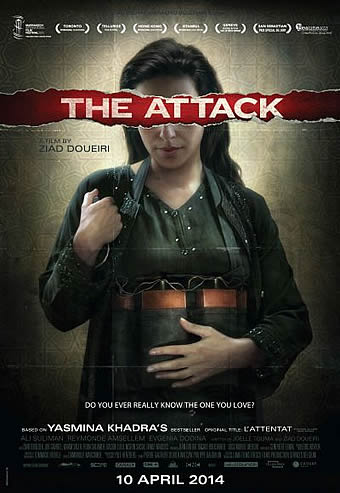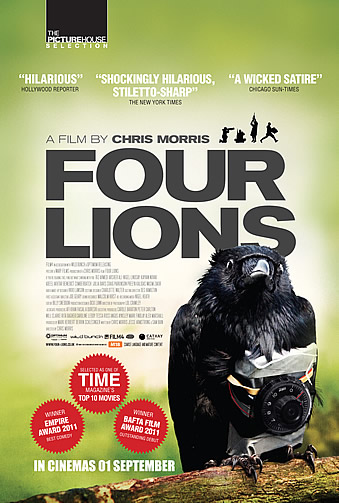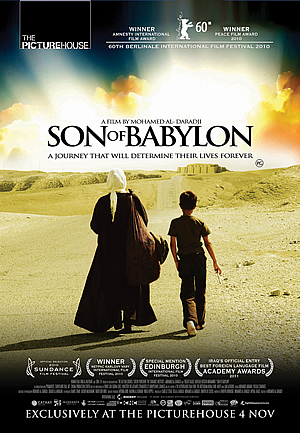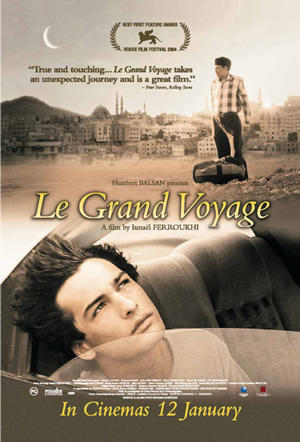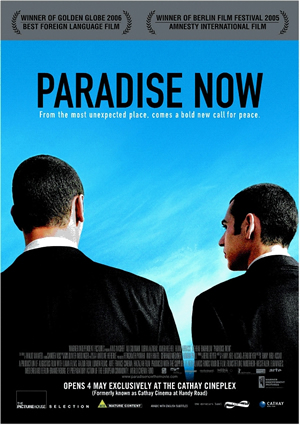THE ATTACK (2012)
Genre: Drama/Thriller
Director: Ziad Doueiri
Cast: Ali Suliman, Uri Gavriel, Reymond Amsalem, Evgenia Dodena, Dvir Benedek, Ruba Salameh
RunTime: 1 hr 43 mins
Rating: M18 (Mature Content)
Released By: Cathay-Keris Films
Official Website:
Opening Day: 10 April 2014
Synopsis: An Arab surgeon living in Tel Aviv discovers a dark secret about his wife in the aftermath of a suicide bombing. Dr. Amin Jaafari is an assimilated Arab surgeon who seems to have it all with a promising career with honors among the Israelis in Tel Aviv. That all changes after a devastating terrorist suicide bombing and his beloved wife, Siham, is found among the dead as the primary suspect. Although initially refusing to accept that as Shin Bet interrogates him, Amin comes to realize the allegations are true. Now, the ostracized Amin resolves to find out on his own why Siham had so strong a conviction that she kept secret from him. However, the answers prove hard to come by and the truths involved have a terrible pain of their own.
Movie Review:
Many films have been made of the Israeli-Palestinian conflict, but few possess the poignancy and profundity that Zaid Doueiri’s film ‘The Attack’ does. Adapted and directed by Doueiri from the bestseller by Algerian novelist Yasmina Khadra (the pen name of Mohammed Moulessehoul), it makes compelling cinema out of a sensational premise: A a prominent Israeli surgeon of secular Palestinian background has his life turned upside down when he learns that his wife may be responsible for the suicide bombing that killed 17 people in a restaurant, including 11 children celebrating a birthday.
The contradiction is apparent right from the get-go. The bomb goes off just a day after Amin (‘Paradise Now's’ Ali Suliman) receives the equivalent of a medical Oscar from the Israeli Society of Surgeons, the first time in 41 years that an Arab has won the honour, a fact which he acknowledges in his thank-you speech and adds “I'm looking forward to the next 20 years”. Then, minutes after the bombing, Amin is racing against time in the operating theatre to save the lives of those brought to the brink of death by his wife Siham’s (Reymonde Amsellem) detonation – though of course he doesn’t yet know it.
Therein lies the hook of the film: How could Amin not have known about Siham’s beliefs and inclinations as a terrorist after 15 years of marriage? Even after being presented with the nature of her wounds and other circumstantial evidence by the police, Amin refuses to believe that the woman whom he knew “wouldn’t hurt a fly” was in fact a fundamentalist who decides to take her own life and those of many other innocents. With sharp undivided focus, Doueiri charts Amin’s descent from a self-assured man to one who goes from denial to bewilderment to anger to grief to finally understanding.
That journey of discovery will take Amin from Tel Aviv to Nazareth, where his wife was from, and then on to Nablus, where she spent the last night of her life. Though it may unfold like a detective story, this is also a lesson in perspective, as Amin starts to immerse himself in the reality of living in occupied lands – indeed, while Siham is chastised as a murderer of children in Israel, her picture is suddenly on every wall in the West Bank where she is hailed as a martyr. The why only becomes clear right at the end, as Doueiri shows Amin standing amid a pile of rubble marked by a piece of graffiti reading “Ground Zero” which we are told was the site of a massacre in the West Bank town of Jenin that formed the trigger for Siham’s ideological conversion.
To be sure, Doueiri’s film will not please those whose views about the Israeli-Palestinian conflict are already entrenched - indeed, that’s the reason why it has been banned in almost all Arab countries following a boycott request by the Arab League. And yet, the beauty in Lebanese filmmaker Doueiri’s approach lies in his ability to be sympathetic to both sides, portraying with sensitivity and nuance the complexities that lie at the heart of a conflict which ultimately defies solution. There is no black and white to the situation, and Doueiri never does paint it as such; instead, he raises profound questions about cultural identity, history and fanaticism in a way that is both thought-provoking and heartfelt at the same time.
Anchored by a low-key but always gripping turn by Suliman, ‘The Attack’ blends intrigue and realpolitik into a deeply engaging study of modern Palestinian identity. But aside from the weighty issues of moral responsibility and political neutrality, it is at its heart also a love story, and an absolutely moving one at that. At no point during Amin’s search for answers does he waver in his love for Siham or his faith in their marriage; indeed, there is good reason why Doueiri closes the movie with the same words with which he begins it - by echoing Amin’s sentiment when he answers why he cries every time he and Siham part, “Every time you leave me, a part of me dies.”
Movie Rating:




(Intelligent and deeply poignant, this gripping film set against the backdrop of the Israeli-Palestinian conflict is both a love story and a thought-provoking exploration of cultural identity)
Review by Gabriel Chong
You might also like:
